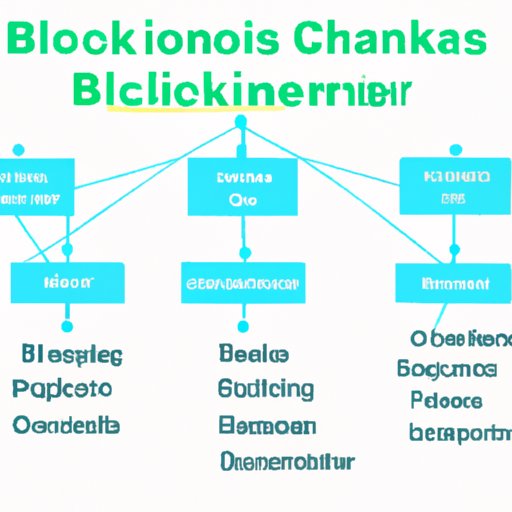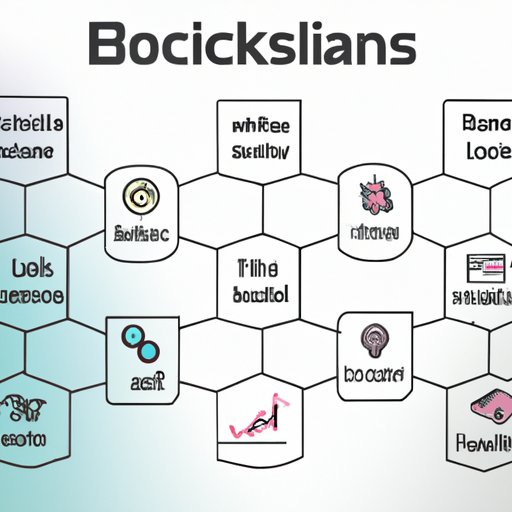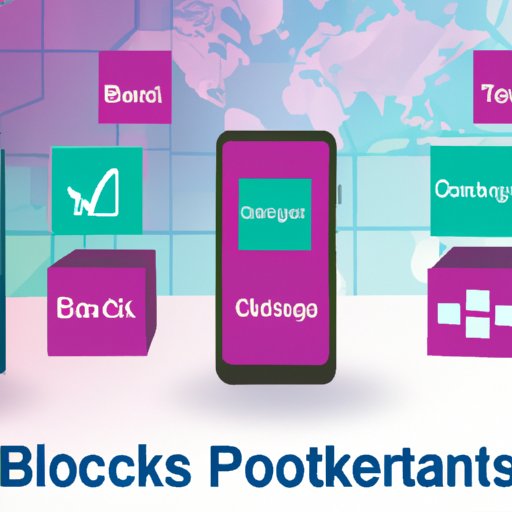Introduction
Blockchain applications are a type of software that uses blockchain technology to enable transactions and data exchange between two or more parties. This type of application has become increasingly popular in recent years due to its ability to provide secure, transparent, and efficient transactions. In this article, we’ll explore the basics of blockchain applications, their advantages, benefits, types, and how they are transforming different industries.

Exploring the Basics of Blockchain Applications
Before diving into the specifics of blockchain applications, let’s first explore what a blockchain is and how it works. A blockchain is a distributed ledger technology that records and stores information about digital transactions. It is composed of blocks, which are linked together using cryptography. Each block contains data about the transaction and is time-stamped and stored on multiple computers around the world. The data on the blockchain is immutable, meaning it cannot be changed or modified once recorded. This ensures that the data is secure and tamper-proof.
Now that we have an understanding of what a blockchain is, let’s look at how a blockchain application works. Basically, a blockchain application is a set of rules that govern how transactions and data are exchanged between two or more parties. The rules are programmed into the application, which then communicates with the blockchain to execute the transactions. The application also verifies the accuracy of the data before it is added to the blockchain.
Breaking Down the Advantages of Blockchain Applications
There are several advantages to using blockchain applications, such as improved security and data protection, reduced costs, and increased efficiency. Let’s take a closer look at each of these benefits.
Improved Security and Data Protection
One of the main advantages of using a blockchain application is improved security and data protection. Because the data is stored on multiple computers around the world, it is virtually impossible for hackers to access or manipulate the data. Additionally, each transaction is encrypted and verified by the network, so there is no risk of data being corrupted or lost.
Reduced Costs
Another benefit of blockchain applications is that they can reduce costs associated with transactions. Because the transactions are processed automatically, there is no need to pay fees to third-party intermediaries. This can lead to significant cost savings for businesses.
Increased Efficiency
Finally, blockchain applications can increase the efficiency of transactions. Since the data is stored on the blockchain, it can be accessed quickly and securely, eliminating the need for manual processes. Furthermore, transactions can be completed in minutes, rather than days or weeks.
Understanding the Benefits of Using a Blockchain Application
In addition to the advantages mentioned above, there are several other benefits to using a blockchain application. These include increased transparency, faster transaction times, and greater accountability.
Increased Transparency
Using a blockchain application can increase transparency in the way data is stored and shared. All transactions are visible to all participants on the network, and the data is immutable, meaning it cannot be changed or manipulated once it is recorded on the blockchain.
Faster Transaction Times
Another benefit of blockchain applications is that they can facilitate faster transaction times. Transactions are processed almost instantaneously and are completed in minutes, rather than days or weeks.
Greater Accountability
Finally, blockchain applications can help ensure greater accountability. Since all transactions are recorded on the blockchain, it is easy to track who is responsible for any given transaction. This can help reduce fraud and ensure that all parties are held accountable for their actions.

Analyzing the Different Types of Blockchain Applications
There are three main types of blockchain applications: public blockchains, private blockchains, and consortium blockchains. Let’s take a closer look at each of these.
Public Blockchains
Public blockchains are open to anyone and everyone. They are decentralized, meaning that there is no single authority that controls the network. Anyone can access the data and participate in the network, making them ideal for applications that require high levels of transparency.
Private Blockchains
Private blockchains are closed networks that are controlled by a single entity. Only authorized users can access the data and participate in the network, making them ideal for applications that require a high level of privacy. Unlike public blockchains, private blockchains are not decentralized.
Consortium Blockchains
Consortium blockchains are a hybrid between public and private blockchains. They are controlled by a group of entities, rather than a single entity, and only authorized users can access the data and participate in the network. Consortium blockchains are ideal for applications that require both high levels of transparency and privacy.

Investigating How Blockchain Applications are Transforming Industries
Blockchain applications have the potential to transform many different industries, from finance to healthcare. Let’s take a look at how they are being used in three key sectors.
Financial Services
Blockchain applications are being used in the financial services industry to facilitate faster and more secure payments. For example, banks are using blockchain applications to process international payments in minutes, rather than days. This has led to significant cost savings for businesses and consumers.
Supply Chain Management
Blockchain applications are also being used in the supply chain management industry to improve transparency and traceability. By tracking products from source to destination, companies can ensure that their goods are of the highest quality and that they are being delivered on time. This helps reduce costs and improve customer satisfaction.
Healthcare
Blockchain applications are being used in the healthcare industry to securely store and share sensitive patient data. This helps reduce errors and streamline processes, leading to better patient outcomes and lower healthcare costs.
Conclusion
In conclusion, blockchain applications are a type of software that uses blockchain technology to enable transactions and data exchange between two or more parties. They offer numerous benefits, such as improved security and data protection, reduced costs, and increased efficiency. Additionally, there are three main types of blockchain applications: public blockchains, private blockchains, and consortium blockchains. Finally, blockchain applications are transforming many different industries, from finance to healthcare.
It is clear that blockchain applications have the potential to revolutionize the way we do business. By providing secure, transparent, and efficient transactions, they can reduce costs, increase efficiency, and ensure greater accountability. As blockchain technology continues to evolve, we can expect to see even more innovative applications emerge in the future.
(Note: Is this article not meeting your expectations? Do you have knowledge or insights to share? Unlock new opportunities and expand your reach by joining our authors team. Click Registration to join us and share your expertise with our readers.)
